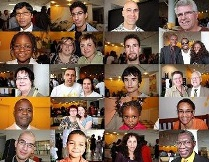
Practical information
Registration for this conference is closed.
Watch the videos of General Bostick and Senator Jesus "Chuy" Garcia's speeches.
This conference is organised as part of the "Migrations & Employers" program of the Centre for Migrations and Citizenship, which was launched in September 2010. This program seeks to identify the expectations of French and European employers towards national and EU migration policies: could employers be involved in the definition of national migration policies? And what would migration policies look like if they tended to the expectations of employers?
The conference is organised in partnership with the Embassy of the United States in Paris, France. Speakers will present in English. No translation services will be provided.
Context:
Migration policies impact the economic sector: they shape the numbers and profile of foreigners entering a national economic market, their reception conditions, and they influence the needs and nature of an adequate diversity strategy. But the impact of economic actors on the making of migration policies is less certain:
What role can and do economic actors play in the elaboration of migration policies?
This question is at the core of this international conference, which examines what could be learned from a country, the United States, whose migration and integration policies strongly differ from those of France.
Former State Senator and now Cook County Commissioner Jesus “Chuy” Garcia will address the role that economic actors can play in the making of migration policies.
At the other end of the migration process, 3-star U.S. Army General Bostick will share with us his insight on the diversity recruitment strategies of one of the nation"s largest recruiters, whose policies in terms of diversity have often been groundbreaking.
Other events

From Ambition to Action: Exploring Technological Partnerships with India
The 16th EU-India Summit, held on January 27th in New Delhi with European leaders António Costa, Ursula von der Leyen, and Prime Minister Narendra Modi, marks a significant milestone in deepening EU-India relations. At the same time, official bilateral visits from EU member states are on the rise, including that of the French President, who visited India in February to participate in the Artificial Intelligence Summit. As India asserts its technological ambitions and seeks to reduce its dependence on China, Europe is stepping up its efforts to diversify its strategic partnerships.

The Enlargement of the European Union: A Strategic Choice? France, the Western Balkans and the EU in an Uncertain Geopolitical Context
Russia’s war against Ukraine has brought the enlargement of the European Union back to the centre of European strategic debates. In this context, the Western Balkans have regained heightened visibility in discussions on the continent’s security, at a time when the international environment is marked by a growing number of destabilising factors.






